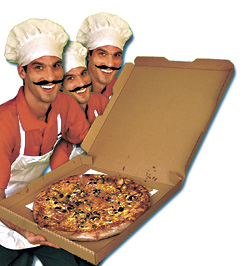John Peter Hasson has been one of my favorite performing artists in Seattle for more than a decade, and now we are losing him to Los Angeles.
Describing Hasson, and the ludicrous, charming dork rock he has masterminded under the moniker Pleaseeasaur since 1997, has always been a challenge. With extensive aesthetic assistance from longtime collaborator and visual artist Thomas Hurley III, Hasson has steadily built a cult following that is hypnotized by the ‘Saur’s inane blend of awkward, crowing humor, goofy, homemade costumes, and lo-fi electronic sound collages, as well as Hurley’s imaginative, unpredictable projections and props. Tours with equally deranged underground figures like Neil Hamburger and hipper indie acts like Pinback and Black Heart Procession have helped raise his profile over the years.
As implausible as it sounds that a repertoire of material extolling the joys of red meat, the dangers of cobras, and the enduring hilarity of Knight Rider could lead to a sweet contract with Comedy Central, that’s precisely what happened to Hasson in 2006. “I’m lucky, and I also don’t give a fuck what anybody says,” Hasson says softly but assuredly. “I haven’t had a day job in 13 years. I’m persistent.” He inked a four-record deal with the cable station, starting with the release of The Amazing Adventures of Pleaseeasaur, a double DVD and CD set of songs and videos tied together with help from a 30-minute cartoon animated by the same artists responsible for Adult Swim‘s SeaLab 2021 series. For a surprisingly shy, punk-minded guy raised on the Dead Kennedys and inspired by the Dead Milkmen, that’s quite an achievement.
That success has led to further opportunities in television, and he and Hurley are in the midst of talks with another well-known cable entity as we go to press. This Saturday, March 15, Pleaseeasaur will leave town on a very high note, opening the Presidents of the United States of America record release party at the Paramount (they will also be touring with PUSA throughout the spring). “The fact that we are playing the Paramount…,” says Hasson, obviously grateful and pleasantly overwhelmed; “I saw my very first concert there. It feels really good.” As for the motivation for relocating to L.A., he acknowledges it’s not something he would have predicted for himself. “Ten years ago I was one of those people who hated L.A. Now I have more friends there than I do here.”
Hasson’s move is a loss for Seattle, and unfortunately for us, he’s just the latest in a long line of locals who are migrating south. Over the past few years we’ve lost Coady Willis and Jared Warren of thundering duo Big Business, respected music photographers like Robin Laananen and Bootsy Holler, musician and former Sub Pop publicist Jed Maheu, producer Scotty Crane, and most recently, Night Canopy frontwoman Amy Blaschke. Her bandmate, former Pretty Girls Make Graves drummer Nick deWitt, will be joining her shortly. Illustrator and scene fixture Rick Klu, whose distinct style has been part of the Seattle nightlife landscape since the early ’90s, is planning to leave for L.A. this summer.
In the mid-’90s, suggesting a move to L.A. would likely have gotten you laughed right out of the Crocodile. There was a collective cultural assumption that the City of Angels was nothing more than a bastion of slick, commercial pop and celebrity worship, with a punk scene that ran its course in the early ’80s, and a lingering smell of Aqua Net still wafting up from the Sunset Strip. All you have to do is turn on the E! channel to realize that many of those assumptions are still truisms, but what more and more Seattle musicians are discovering is that there is also a fertile and thriving community for artists with DIY sensibilities and independent spirits.
“Traditionally, when people think of Los Angeles they tend to conjure up images of Hollywood, the entertainment industry, the pursuit of notoriety and wealth, beach nerds, boob jobs, lame bands and bad hair,” agrees Arlie Carstens, the former frontman for Juno who left Seattle for L.A. in 2004. “But that’s all just marketing or long gone history. Los Angeles is a dramatically different place now than it was even ten years ago; it offers a great deal more than that which mainstream media and occasional out-of-town visits can detail. Here, so long as you know who you are, enjoy what you do, and stay true to what truly moves you, then all that plastic stuff just recedes into the background.”








